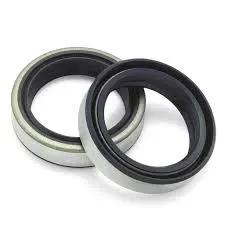9 月 . 25, 2024 06:39 Back to list
Understanding TC Type Oil Seals and Their Importance in Machinery Applications
Understanding TC Type Oil Seals An Essential Component in Machinery
In the world of machinery and mechanical applications, oil seals play a critical role in ensuring the smooth operation of mechanical systems. One of the commonly used types is the TC type oil seal, which is renowned for its robustness and effectiveness in preventing leakage and contamination in various applications.
What is a TC Type Oil Seal?
The TC type oil seal is a specific design characterized by its dual lip structure. It consists of two sealing lips — an inner lip that retains lubrication and an outer lip that prevents external contaminants from entering. This design maximizes the sealing function and extends the operational lifespan of the equipment. The “TC” designation typically indicates features such as a metal case, a rubber sealing lip, and sometimes a spring mechanism for enhanced pressure stability.
Applications of TC Type Oil Seals
TC type oil seals are versatile and can be found in a range of applications across various industries. They are commonly used in automotive, aerospace, marine, and industrial machinery. For instance, in automotive applications, TC seals are critical components in engines and transmissions, helping to maintain oil pressure and prevent leaks. In the industrial sector, these seals are used in pumps, gearboxes, and any machinery that requires the retention of lubricating fluids.
The demand for TC type oil seals continues to grow, as they offer a reliable solution for preventing leaks, thus increasing the efficiency and longevity of machines. Their ability to withstand harsh environments, including extreme temperatures and pressures, makes them ideal for both heavy-duty and light machinery.
tc type oil seal

Advantages of TC Type Oil Seals
The TC type oil seal provides several benefits. First and foremost is its ability to effectively maintain the integrity of lubricants within machinery, which is essential for reducing friction and wear on moving parts. This not only enhances performance but also minimizes maintenance costs over time.
Moreover, the dual lip design of TC seals allows them to handle dynamic applications where there are movements between the shaft and the housing. Additionally, the robust construction featuring a metal casing offers greater resistance to deformation, which can occur under high-pressure conditions.
Another advantage is the availability of various materials for the sealing lips, including rubber compounds that can be chosen based on the specific requirements of temperature, chemical resistance, and physical properties. This customization ensures that there is a TC seal suitable for virtually any environment.
Conclusion
In summary, TC type oil seals are integral components in a wide array of machinery. Their innovative design, characterized by dual sealing lips and robust construction, provides reliable performance in preventing leakage and protecting against contaminants. As industries continue to evolve, the importance of high-quality sealing solutions like TC oil seals cannot be overstated. They ensure optimal performance, reduce the frequency of maintenance, and ultimately contribute to the efficiency and longevity of mechanical systems. For anyone involved in machinery maintenance or manufacturing, understanding the significance of TC type oil seals is essential in achieving operational excellence.